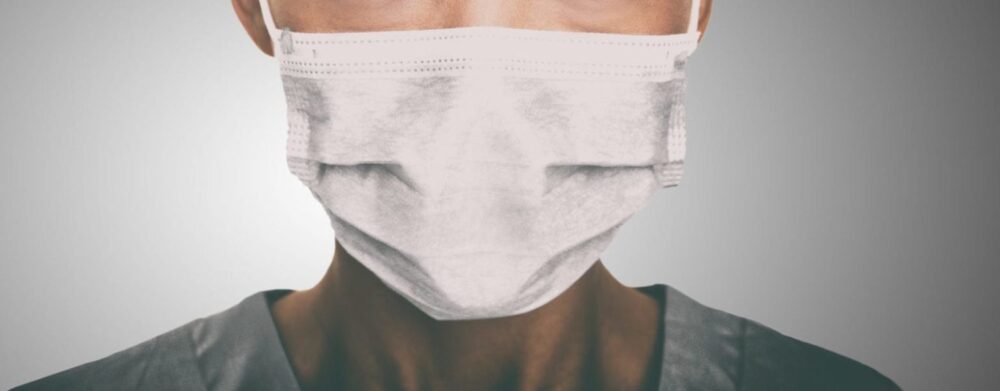As hospitals around the country watch their supply of personal protective equipment (PPE) diminish, they have severely curtailed their use. Healthcare professionals on the frontlines of the COVID-19 pandemic are being subject to constraints so restrictive that some believe their health is being sacrificed to ease staff and patient morale.
Healthcare Workers Being Disciplined For Wearing PPE
“One of my biggest concerns is the nontransparent way management is addressing these issues,” said one California nurse. “If we don’t start treating healthcare workers as adults, providing us with honest information, adequate protection, and supplies, I am terrified that this current situation will quickly escalate, not just with viral spread, but with staffing shortages through contagion and/or the ‘rats off a sinking ship’ scenario.” Management at her hospital told staff that they could be fired for wearing N95 masks—when asked about the policy, this nurse was told she needed a note from her doctor if she was going to wear one.
This case is not unique—many healthcare professionals are being told by hospital administrators that they cannot wear PPE in the hallways or self-supply PPE. Some healthcare professionals are even being threatened with disciplinary actions or being fired when they have continued to use PPE.
While hospitals tout PPE conservation as one of the driving forces behind these policies, healthcare workers are not happy. Some hospital administrators are telling healthcare workers that working without PPE is safe, but provide no evidence to back up their claim.
Some healthcare workers are even being told not to wear PPE because it “scares the patients.” Take, for example, an emergency physician in Maryland who said that his hospital had warned physicians that they could not walk around with masks or other PPE. When an administrator saw this physician was wearing a surgical mask on the ward, he told the physician that he was “not setting a good example for other staff members,” and that “it was important during this time to not scare patients.” The physician says, “I’m angry just talking about this and almost want to disclose the hospital…[but doing so] would be certain termination for me.” Healthcare workers are anxious, fearful, and angry, but fear retribution for speaking out.
The American Academy of Emergency Medicine Speaks Out
The American Academy of Emergency Medicine released its own position statement, declaring that it would support any emergency physician who was threatened or terminated for wearing self-supplied PPE, including “assistance with filing an OSHA [Occupational Health and Safety Administration] complaint and pursuit of litigation for wrongful termination.”
Your Protections
What protections are available to you if you are a healthcare worker who finds yourself in this position?
OSHA & NLRA Protections
In the event of immediate or imminent danger, the Occupational Safety and Health Administration (“OSHA”) provides that an employee can refuse to work. The National Labor Relations Act (“NLRA”) also protects concerted activities by employees, which includes a refusal to work because of unsafe working conditions.
OSHA has the authority to prevent retaliation against workers who shed light on violations of numerous federal statutes. The Occupational Safety Health Act (OSHA) prohibits employers from punishing whistleblowers, so long as an employee files a complaint within 30 days of the punishment. The OSH Act provides employees with the ability to refuse an unsafe job assignment, as long as they have made their concerns known to a supervisor and the supervisor fails to mitigate the danger.
Pursuant to the NLRA, nonsupervisory employees (whether unionized or non-unionized) may have the right to refuse to work in conditions they believe to be unsafe. However, in order to refuse to work, the employee must have a “reasonable, good faith belief” that working under certain conditions would not be safe.
Unionized employees undergo a separate analysis pursuant to Section 502 of the NLRA: refusal to work over safety concerns is protected for unionized employees if the assignment is “abnormally dangerous.” These employees must have a “good faith belief” supported by ascertainable and objective evidence that this working condition exists.
Protection From Retaliation
Employees who voice concerns about unsafe work conditions or object to illegal business practices also cannot be fired on the basis of those complaints. Known as whistleblowers, these workers are shielded from wrongful discharge by the New Jersey Conscientious Employee Protection Act (CEPA). Employees who shed light on wrongdoing by their employer are protected under state and federal law, and can receive reinstatement to their position, back pay and in some cases a portion of whatever funds government officials recoup from the offending employer.
Employment Attorneys At McOmber McOmber & Luber, P.C. Advocate On Behalf Of Victims Of Whistleblower Retaliation
If you are a healthcare worker and any of the above examples seem like your experience at work, please let us help you. The attorneys at McOmber McOmber & Luber, P.C. take a proactive approach to each and every legal issue our clients face. Call our Red Bank office at 732-842-6500, our Marlton office at 856-985-9800, our Newark office at 973-878-9040, or contact us at 888-396-0736 or online for a free consultation. We represent clients throughout New Jersey.

